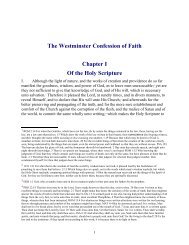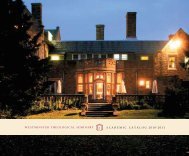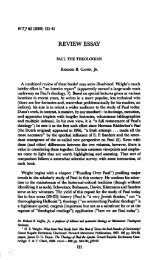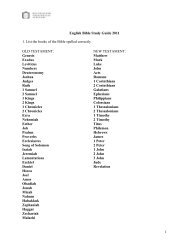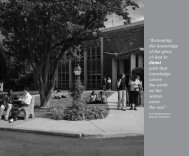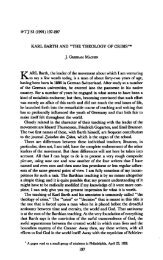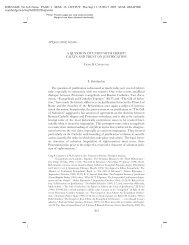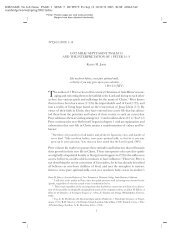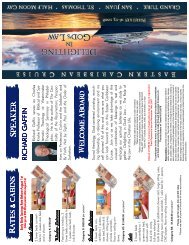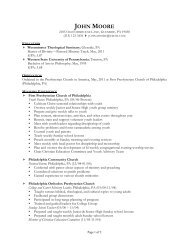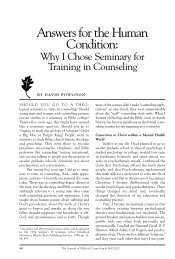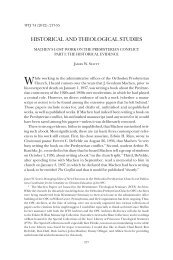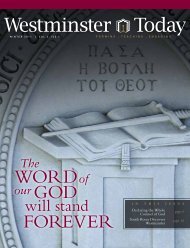2009 - 2010 Academic Catalog - Westminster Theological Seminary
2009 - 2010 Academic Catalog - Westminster Theological Seminary
2009 - 2010 Academic Catalog - Westminster Theological Seminary
Create successful ePaper yourself
Turn your PDF publications into a flip-book with our unique Google optimized e-Paper software.
{Course Descriptions}<br />
New Testament<br />
<strong>2009</strong>–<strong>2010</strong><br />
New Testament<br />
To accept the New Testament as canonical is, in a word, to acknowledge<br />
the twenty-seven writings in the second part of the Holy Bible<br />
as possessing divine authority and as constituting, accordingly, an<br />
integral part of the divine rule for faith and life... There is implicit in<br />
the claim of canonicity, therefore, the judgment that divine inspiration<br />
has constituted these writings with a quality that sets them<br />
apart from all merely human writings. Those who accept this high<br />
view of the New Testament, accordingly, do not shrink from identifying<br />
it as the Word of God, the infallible and inerrant rule of faith<br />
and life.<br />
– Ned B. Stonehouse<br />
The New Testament is the account of the presence of the kingdom<br />
of heaven, and centers in the person of Jesus Christ. This is the<br />
cornerstone for all Christian ministry. The New Testament department<br />
is committed to teaching the New Testament, with all of the<br />
aspects entailed, as the full revelation of the covenant of God’s<br />
grace in Jesus Christ.<br />
To this end, the New Testament curriculum enables students:<br />
• To acquire a reading knowledge of New Testament Greek<br />
• To understand and value the historical context in<br />
which God accomplished his work in Christ, and<br />
through which he gave us the New Testament<br />
• To perceive the unity of the Old and New Testaments<br />
and the hermeneutical significance thereof<br />
• To grapple with the challenges of biblical interpretation<br />
• To recognize major biblical-theological themes<br />
of the New Testament and their importance<br />
for understanding the biblical message<br />
• To evaluate the ways in which the New Testament<br />
has been interpreted in the past<br />
• To develop skill in understanding and applying<br />
each of the books of the New Testament<br />
New Testament faculty: Professor McCartney, Coordinator; Professor<br />
Poythress; Associate Professor Smith; Assistant Professor Greene;<br />
Mr. Mininger.<br />
Master’s level<br />
NT 010, 011, 013 New Testament Greek a<br />
Purpose:<br />
• To prepare students for further work in the New Testament<br />
by giving them a reading knowledge of Koiné Greek<br />
The course is designed for beginners; no prior knowledge of Greek<br />
is assumed. The students will cover the basics of grammar and<br />
acquire a core vocabulary. During the last semester students will<br />
do recitations from the Greek New Testament and be introduced<br />
to the issues of syntax.<br />
The instructional sequence is as follows: summer term, four<br />
hours; fall and spring semesters, three hours. Students must<br />
begin course with the summer term (see “Placement in Greek and<br />
Hebrew” on page 52). Auditing not permitted. Staff.<br />
NT 021, 022, 023 New Testament Greek aa<br />
This course is identical in content with NT 010, 011, 013.<br />
The instructional sequence is as follows: fall semester, four<br />
hours; winter term, two hours; spring semester, four hours. Students<br />
must begin course with the fall semester (see “Placement in Greek<br />
and Hebrew” on page 52). Auditing not permitted. Staff.<br />
NT 031, 033 New Testament Greek b<br />
For purpose and content see NT 010, 011, 012, but note that,<br />
because previous formal study of at least six semester hours<br />
is presupposed, the material will be covered at an accelerated<br />
pace.<br />
Fall and spring semesters, three hours each. Students must<br />
begin course with the fall semester (see “Placement in Greek and<br />
Hebrew” on page 52). Auditing not permitted. Staff.<br />
100



